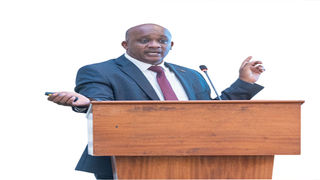
Mr Julius Mukunda, a budget and policy expert during the interview. PHOTO/ISMAIL MUSA LADU
|Prosper
Prime
New taxes will hurt post Covid-19 growth, says budget expert
What you need to know:
Armed with about Shs50 trillion worth of the projected national budget, the government is still the biggest spender. In an interview with Prosper Magazine’s Ismail Musa Ladu , Mr Julius Mukunda, a budget and policy expert explained the source of budget cracks and why it is crucial for local suppliers not to be considered a footnote in the payday. Excerpts….
The national budget appears to have increased by over a trillion shillings. This must be good news.
Although we understand that the budget has increased, we must not lose sight of the fact that discretionary spending has also been reduced by Shs2.5 trillion. This is primarily because we need to pay the debts that are now conspicuous in the budget and hard to ignore. It is about time we started thinking about tackling debt issues.
We can begin by being frugal. I am often surprised when I see ministries, departments and agencies of government (MDA) crying out loud because of budget cuts. They do this because they think we are still in the pre-Covid-19 pandemic times of two to three years ago when some if not many of them would spend the way they want. Not anymore.
These MDAs must quickly realise that the budget cuts are a reflection of how much is there to go around. The fact is at this point, there are not enough resources to go around.
Much as resources may not be enough to go around, MDAs have an obligation to discharge their responsibilities.
I get that. And I am saying that sectors (MDAs) must now be focusing on spending the budget on core or top priority activities only. MDAs must only attend to their main activities before anything else. For example, if the priority for Uganda National Examination Board is to mark exams, then that is where the budget should focus.
We also think there should be a halt on all the mega projects in the pipeline right now. We have not had SGR for so many years and it will do no more harm if it is hibernated for the next two years as we negotiate the murky times. This means we shall not have to borrow more money in the names of upcoming mega projects. Instead, the concentration should be on operation and maintenance of the existing infrastructure. So patching up and repairing our roads to a functional condition is something we support.
Importantly, local suppliers should and must always be a priority for MDAs.
It makes no sense for domestic suppliers, many of whom operate on tight budgets, to spend months and in some cases years, without being paid for their services. This has implications on jobs, livelihoods and the economy.
We are, however, glad that more money has been allocated to clear outstanding domestics suppliers arrears and we are also impressed with commitment by the Ministry of Finance leadership to ensure that no more arrears are accumulated. If it does, the responsible accounting officers will be held liable.
Last financial year, there were no fundamental tax measures introduced, there could be a change of mind this time round. Are you in favour of that?
We really don’t expect the government to introduce new taxes because it will be a huge blow on the strides made so far towards economic recovery following the toll Covid-19 pandemic and the recent inflation that has taken on livelihoods, businesses and the economy.
Economic growth trajectory is looking fairly good. The economy is expected to grow by 4.3 per cent from a projection of about 3.5 per cent. This is promising growth and this is in part because we never introduced new taxes this financial year.
According to the Secretary to the Treasury, Dr Ramathan Ggoobi, we should be more afraid about uncontrollable individual debts we accrue than the public debt which is in a safe pair of government hands. What are your thoughts?
Look, when it comes to debt we incur individually amongst each other, the repercussion is obvious in terms of depletion of our personal savings.
At the end of the day we are compelled to dig into our savings to offset the debt. There are also several other legal ways for you to be personally held liable. But for the government to pay off its debts in whichever form, everybody will have to shoulder the burden in one way or the other.
That is why the population should be concerned about the public debt. While our debt is still sustainable, if the appetite to borrow remains insatiable, then we shall soon hit the unsustainability road within no time – and that is what we don’t want.
Is the projected national budget speaking to reality on the ground?
I believe to a greater extent speaks to the situation we are currently in. But more needs to be done in terms of funding sectors such as tourism, agriculture and climate change beginning with enforcement against environmental degradation. I would really have also loved to see proper money allocated for extension and research, given that the Parish Development Model is anchored around these two major areas.
I would also have loved to see deliberate attempts made to create a market for our organic products. That is missing in the projected budget. I haven’t seen the strategy the government is having to sell commodities in the East African region or even the continent and beyond.
Issues about irrigation should be scaled up. We need to grow beyond pure dependence on rain-fed agriculture. These though will require mindset change whose budgets have suffered massive cuts.
Despite all that, the programmed budget is redirecting resources to sectors that address citizens. There are commendable attempts to address the bottom of the pyramid issues.
As a budget and policy expert, what are your thoughts about budget implementation?
We are still lacking. Government is aware about this and our hope is that something is done.
We need to prepare ahead of implementation. Many of these are planned activities so their implementation must be efficient.
There shouldn’t be room for complacency and mediocrity. This is why we believe in preparedness ahead of enforcement. For example, even though PDM should have been rolled out, there thousands of parishes which haven’t received their part of the bargain – these speak to preparedness ahead of implementation that we keep talking about.
Further, look at Isimba dam, it should have been commissioned by now but it hasn’t. Now we are at a stage hoping somebody can help us to sort this out.
So executions remain a very big problem.





